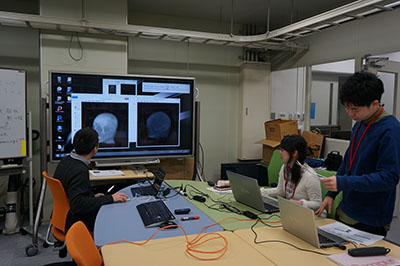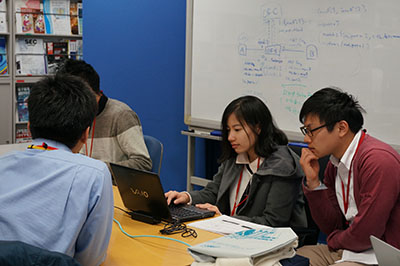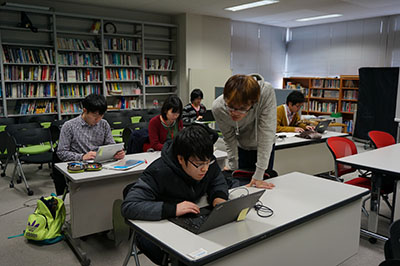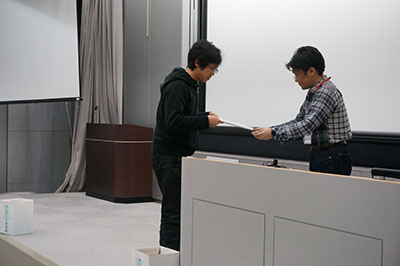Graduate School of Information Science, NAIST
Summer Seminar
Aug. 07-09, 2017
Summer Seminar 2017 will be held on the Graduate School of Information Science, NAIST, on August 07-09. You can experience the cutting-edge research on Information Science during this Summer Seminar.
We are looking forward to your application!




| Date | Aug. 07 - 09, 2017 : 2 or 3 days (Depend on the topics) |
|---|---|
| Venue | Graduate School of Information Science, NAIST (Takayama 8916-5, Ikoma, Nara 630-0192, Japan), or Online |
| Intended audience | Education higher than undergraduate including non-academic applicants who are planning to become IS students. If you are not a candidate, please apply the Lab tour |
| Capacity | Depends on each theme (please check the table below). If the number of applicants exceeds the capacity, a selection process will be done by the corresponding laboratory. |
| Admission fee | FREE! However, we don't cover any travel or accommodation costs. |
| Application form |
Closed
>>>> Confirm the assignment
|
| Contact us | Summer Seminar Committee ss1708[at]is.naist.jp |
What's new
- 2017.07.24 Theme assignment notification email is sent. Confirm the assignment
- 2017.07.17 Application site is closed
- 2017.06.30 Application is started
- 2017.06.27 Website is open and the list of themes is uploaded
Schedule
- Aug. 7 Mon.
09:20 Registration (IS L1 lecture room)
09:30 - 10:00 Introduction (IS L1 lecture room)
10:00 - 17:00 Seminar (Lab.)
- Aug. 8 Tus.
09:20 - 16:45 Seminar (Lab.) 16:50 - 17:20 Ceremony (IS L1 lecture room)
- Aug. 9 Wed.
09:20 - 17:00 Seminar (Lab.)
Themes
- Google cannot answer! How to make the fastest Deep Learning platform?
- Algorithm design toward fault-tolerant systems
- Algorithm design toward molecular robots
- Activity recognition in smart home
- Simulation: Theory and Practice
- Construction of a Parallel Distributed Learning System
- Software Development Bot~Toward Automatic Software Development~
- Software Data Mining using the Jupyter Notebook
- Virtual network programing for Cloud computing
- Let's find bad parts of software !!!
- An in-depth security analysis of OpenStack
- Cryptanalysis based using Side-Channel Information from Cryptographic Module
- Raspberry Pi mesh networking for DR (Disaster Recovery)
- Learning wireless communication using computer simulation
- Understanding wireless power transfer via experiments
- Experiencing the world of vision augmentation using a video see-through HMD
- Generating robot motion from human demonstration observed by first person vision
- Bio-inspired robot control and AI
- Summer Wars of the Machine Learning
- Data Science of Human Anatomy
- Mathematical Science for Image-guided Surgery
| Laboratory: | Computing Architecture |
| Date: | |
| Summary: | Deep Learning has become popular in wide variety of field in our society. To make the fastest Deep Learning platform, you need to understand inside of the Deep Learning and run it on several kinds of computers. Then you will find the answer! |
| Capacity: | 6 |
| Qualification: | Programming experience |
| Laboratory: | Dependable System |
| Date: | |
| Summary: | Most existing systems, such as the Internet, clouds, and IoTs, are distributed systems, which consist of many computers that can communicate with each other. In such systems, it is inevitable that some computers will become faulty. In this seminar, we will design fault-tolerant algorithms, which can work correctly in distributed systems with some faults. |
| Capacity: | 3 |
| Qualification: | None. We will have 3-day seminar if you wish. |
| Laboratory: | Dependable System Laboratory |
| Date: | |
| Summary: | |
| Capacity: | 2 |
| Qualification: |
| Laboratory: | Mobile Computing Laboratory |
| Date: | |
| Summary: | The goal of this project is to gain the ability of developing customized simulators. The project involves learning simulation theory (elements of probability, generating random variables and discrete event simulation approach, etc.) and simulation programming practice. |
| Capacity: | 3 |
| Qualification: | Experience in C/C++/Java programming |
| Laboratory: | Software Engineering Lab |
| Date: | |
| Summary: | By evolving AI and machine learning techniques, various manual tasks will be switched automatic task. In software development field, such movement is coming. Nowaday, developers implement software based on the requirements from users. By using smart machines, software development will be an automatic task. In this seminar, we achieve an automatic software development system by supporting their communication with BOT such as Siri and LineBot. Finally, you study software development approach and bot development in this seminar. |
| Capacity: | 5 |
| Qualification: | Programming experience. Even if you don't have experience for software development, that is fine. |
| Laboratory: | Software Engineering |
| Date: | |
| Summary: | We will work on data analysis, visualization, and machine learning using the Jupyter Notebook. Let's mine actual software development data to find useful knowledge! |
| Capacity: | 3 |
| Qualification: | Programming experience |
| Laboratory: | Software Engineering Laboratory |
| Date: | |
| Summary: | |
| Capacity: | 3 |
| Qualification: |
| Laboratory: | Laboratory for Software Design & Analysis |
| Date: | |
| Summary: | |
| Capacity: | 3 |
| Qualification: |
| Laboratory: | Information Security Engineering Laboratory |
| Date: | |
| Summary: | |
| Capacity: | 3 |
| Qualification: |
| Laboratory: | Internet Architecture and Systems Laboratory |
| Date: | |
| Summary: | |
| Capacity: | 2 |
| Qualification: |
| Laboratory: | Interactive Media Design |
| Date: | |
| Summary: | |
| Capacity: | 6 |
| Qualification: |
| Laboratory: | Robotics |
| Date: | |
| Summary: | We attempt to implement the method for generating robot programs automatically from human demonstration. The method extracts the vision strategy to recognize the task state and observes the actions using a motion capture system. |
| Capacity: | 3 |
| Qualification: | Programming experience |
| Laboratory: | Large-Scale Systems Management Lab. |
| Date: | |
| Summary: | |
| Capacity: | 3 |
| Qualification: |
| Laboratory: | Large-Scale Systems Management Lab. |
| Date: | |
| Summary: | |
| Capacity: | 5 |
| Qualification: |
| Laboratory: | Large-Scale Systems Management Lab. |
| Date: | |
| Summary: | |
| Capacity: | 3 |
| Qualification: |
Lab tour
Please visit Lab Tour.
Access
Please visit Access Map.
Accommodation
Please visit FAQ(in Japanese).
